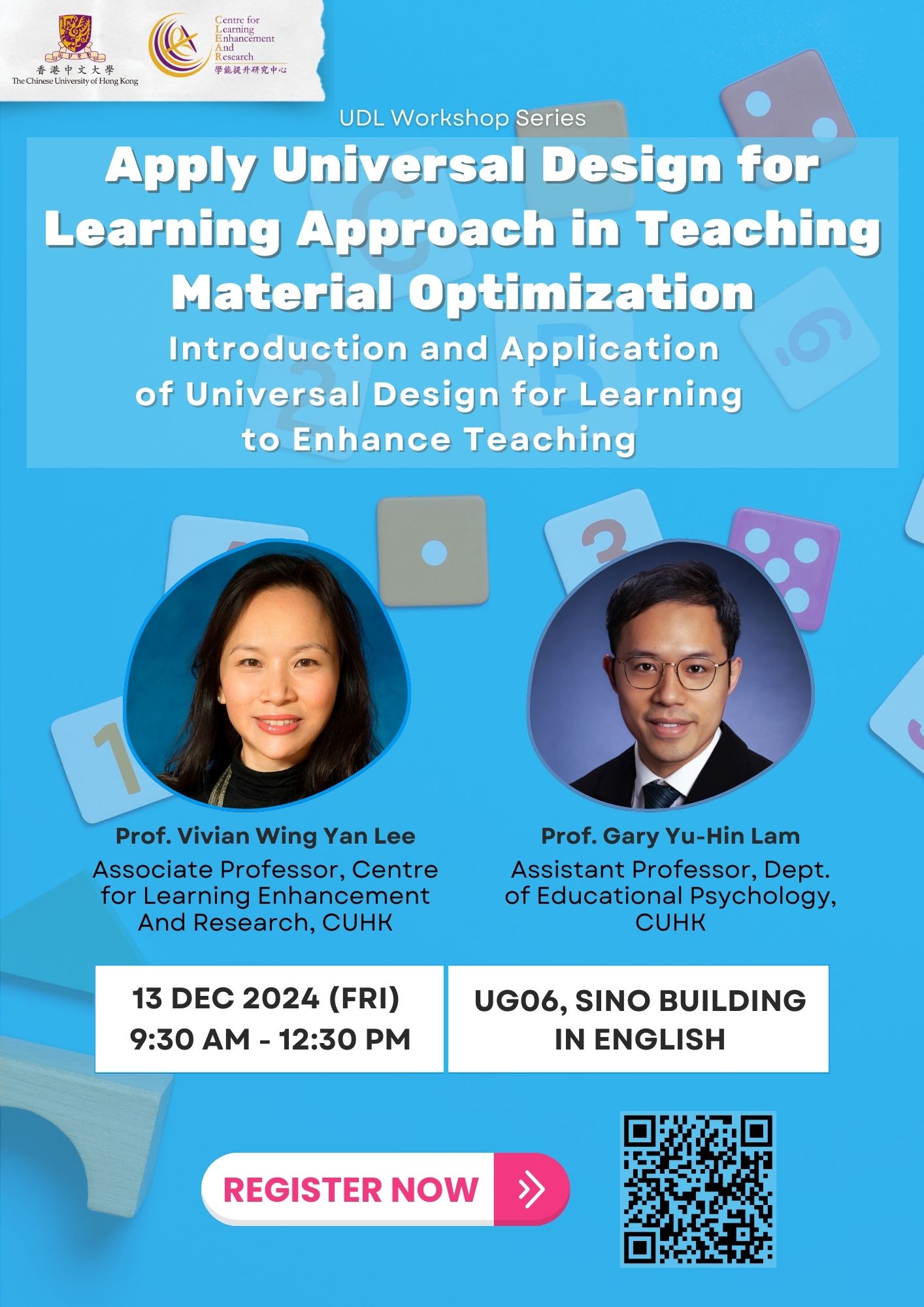UDL Workshop Series: Apply Universal Design for Learning Approach in Teaching Material Optimization
| Overview: | This workshop is a continuation of the previous Universal Design for Learning workshops. Teaching Optimization will help improve teaching efficiency and effectiveness, ultimately enhancing student learning and achieving better outcomes. The workshop is practice-oriented and consists of three parts. The first part introduces UDL as a tool to optimize the learning experience for all students, drawing on the latest UDL Guideline 3.0, with each of the nine principles and 36 considerations delineated by examples in a university context. Since CUHK has offered various educational technologies, the second part will demonstrate how teachers can effectively use these technologies to implement UDL principles. The last part will be a case discussion session focusing on exploring applications of UDL in the classroom, allowing participants to share their experiences, challenges, and strategies for fostering an inclusive learning environment. Our speakers will provide suggestions to address specific challenges participants may encounter in their teaching, as needed. |
| Organiser: | Centre for Learning Enhancement And Research (CLEAR) |
| Speakers: | Professor Vivian Wing Yan LEE, Associate Professor, Centre for Learning Enhancement And Research, CUHK
Professor Vivian LEE is currently an Associate Professor at the Centre for Learning Enhancement And Research at the Chinese University of Hong Kong (CUHK). Her area of focus at CLEAR includes inclusive education, academic advising, service learning, students-as-partners, interprofessional education, and ethical use of artificial intelligence in Higher Education. She is a clinical pharmacist as well as a clinician-scientist of clinical pharmacy outcomes research. She has received numerous teaching awards including the Faculty Education Award (2018), the University Education Award 2014, Vice Chancellor’s Exemplary Award 2010, and Master Teacher Award 2012 at CUHK. In addition to her achievement in teaching and research, Professor Lee is concerned about the students at CUHK and the underprivileged in the community. Professor Gary Yu-Hin LAM, Assistant Professor, Department of Educational Psychology, CUHK Professor Gary LAM is an Assistant Professor at the Department of Educational Psychology at The Chinese University of Hong Kong. His research focuses on better understanding and promoting well-being across the lifespan among individuals with autism and other developmental disabilities. He is a registered Educational Psychologist in Hong Kong and a Licensed Psychologist in the United States who has extensive clinical experience working with children, young adults, and their families and teachers in school and community settings. |
| Date: | 13th December 2024 (Friday) |
| Time: | 9:30 am – 12:30 pm |
| Format: | In-person Workshop |
| Venue: | Room UG06, Sino Building, CUHK |
| Target Audience: | Full-time and Part-time teaching staff in CUHK |
| Quota: | 40 |
| Language: | English |
| Registration Link: |
https://webapp.itsc.cuhk.edu.hk/ras/restricted/event?id=93800
Registration Deadline: 6th December 2024 (Friday) 5:30 pm We hope the workshop will provide some in-depth knowledge and meaningful discussion for the teaching staff in CUHK regarding the Introduction and Application of UDL to Enhance Teaching. Please join us and register now. For enquiries about the workshop, please feel free to contact Professor Vivian LEE at 3943-8012 or by email: vivianlee@cuhk.edu.hk. Note: This workshop is counted towards Part III of the Professional Development Course.  |
| Workshop Rundown | |
| Opening 09:30 – 09:35 (5 minutes) |
|
| Session 1: 09:35 – 10:20 (45 minutes) |
Professor Vivian LEE
|
| Break 1 (15 minutes) | |
| Session 2: 10:35 – 11:20 (45 minutes) |
Professor Vivian LEE & Professor Gary LAM
|
| Break 2 (15 minutes) | |
| Session 3: 11:35 – 12:20 (45 minutes) |
Professor Vivian LEE & Professor Gary LAM
|
| Wrap-up 12:20 – 12:30 (10 minutes) |
|
*Colleagues are encouraged to bring their teaching materials or case examples to share during the case discussion.
